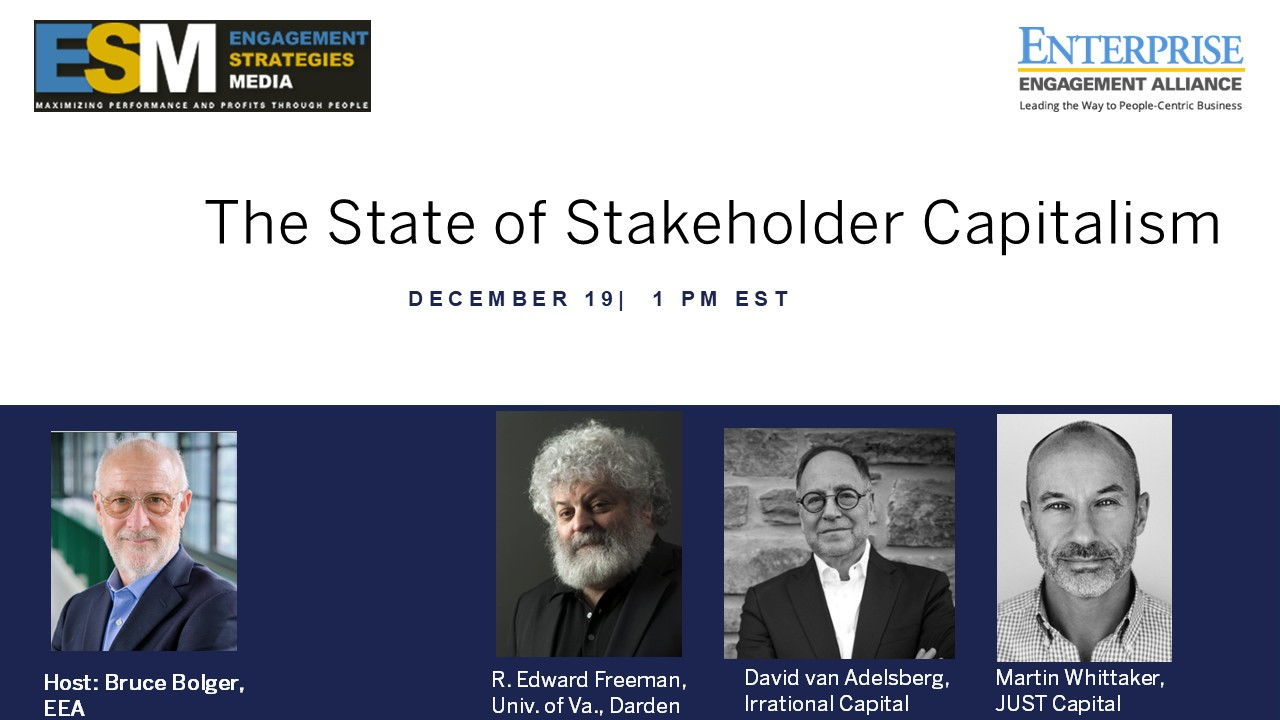State of Stakeholder Capitalism: There's No Going Back
 The Enterprise Engagement Alliance Purpose Leadership, Stakeholder Management YouTube channel features a live update with business leaders whose work supports the principles of stakeholder capitalism. They all agree; there’s no going back.
The Enterprise Engagement Alliance Purpose Leadership, Stakeholder Management YouTube channel features a live update with business leaders whose work supports the principles of stakeholder capitalism. They all agree; there’s no going back.Click here for links to information about EEA sponsors; here to subscribe to ESM weekly; here for an ESM media kit.
Stakeholder capitalism continues to gain ground despite the anti-woke blowback because of the clear economic benefits. The main question now is: how to move from talk to action? That is the key finding from this recent Enterprise Engagement Alliance YouTube Purpose Leadership and Stakeholder Management channel hosted by EEA founder Bruce Bolger featuring:
- R. Edward Freeman, Professor, Business Administration at the Darden School of Business at the University of Virginia, author of the seminar work published in 1984, Strategic Management: A Stakeholder Approach, and often called the “father” of stakeholder capitalism.
- David van Adelsberg, Partner, Irrational Capital, the analytics firm that has developed the Human Capital Factor, a framework for establishing future value creation based on the effectiveness of employee management. See ESM: The Holy Grail of Investing and HR? New Solution Connects Human Capital to Return on Equity.
- Martin Whittaker, CEO, JUST Capital, one of the world’s leading proponents of stakeholder capitalism, whose data is used to manage the Goldman Sachs JUST ETF.
Here are some of the highlights.
- Society is in a transitional moment. People aren’t necessarily angry with capitalism: they expect leadership to be ethical and for business to do more for society, Whittaker says, adding: if you ask the American public what issues matter most, most people put worker-related issues at the top of the list. The majority of people on both sides of the political spectrum except the extremes believe in the principles of stakeholder capitalism, even if they have not heard of the term.
- The jury, Whittaker says, is out and has gone home: the economic benefits of having highly engaged employees has become established through extensive research. Today, the emphasis should be on implementation, not just policy. It takes a system led by the CEO and implemented across the enterprise.
-
According to van Adelsberg, based on the empirical, longitudinal research of Irrational Capital on the Human Capital Factor, independently validated by J.P. Morgan for five years, companies in which employees feel valued and appreciated experience better business outcomes, including:
- Higher returns: Companies that adopt stakeholder capitalism principles often see higher returns in the stock market. For example, the Just Capital index, which reflects the best companies in every industry, has outperformed the Russell 1000 benchmark by 10% since December 2016.
- Lower volatility: These companies also tend to have lower volatility and higher Sharpe ratios (a risk measure), indicating better risk-adjusted returns.
- Employee engagement: Treating employees well leads to higher engagement and productivity, which translates into better financial performance. This is evidenced by the Human Capital Factor, which shows that companies with high employee engagement have significantly higher annualized returns.
- Sustainable growth: Stakeholder capitalism promotes more sustainable growth by ensuring that businesses consider the long-term impacts of their actions on all stakeholders, leading to more stable and resilient companies.
- The people who have linked stakeholder capitalism to woke clearly have not read anything about stakeholder capitalism: it has nothing to do with diverting corporate profits to address the pet social causes of management or because of pressure from social or environmental groups. Freeman notes that companies have always had to address the needs of customers, employees, suppliers, distribution and supply chain partners and communities, and that there have been many companies over the years, such as Whole Foods and Costco, that have embraced these principles.
- When referring to stakeholder capitalism as better business, recognize that “if you do it just because you think you are going to make more money, you will fail,” Freeman underlines. Similarly, paying employees at least a living wage and a commitment to customers is not a guarantee of success. The Container Store is an example of a company committed to stakeholder capitalism principles that is now struggling because of fundamental changes in its market.
- Another driver is the academic community. Freeman says that stakeholder management principles today are taught in most business schools, at least as part of strategic management courses, if not standalone classes. The next generation of educated business leaders will have at least some understanding of the principles.
Enterprise Engagement Alliance Services
 Celebrating our 15th year, the Enterprise Engagement Alliance helps organizations enhance performance through:
Celebrating our 15th year, the Enterprise Engagement Alliance helps organizations enhance performance through:
1. Information and marketing opportunities on stakeholder management and total rewards:
- ESM Weekly on stakeholder management since 2009. Click here to subscribe; click here for media kit.
- RRN Weekly on total rewards since 1996. Click here to subscribe; click here for media kit.
- EEA YouTube channel on enterprise engagement, human capital, and total rewards since 2020
 Management Academy to enhance future equity value for your organization.
Management Academy to enhance future equity value for your organization.3. Books on implementation: Enterprise Engagement for CEOs and Enterprise Engagement: The Roadmap.
4. Advisory services and research: Strategic guidance, learning and certification on stakeholder management, measurement, metrics, and corporate sustainability reporting.
5. Permission-based targeted business development to identify and build relationships with the people most likely to buy.
Contact: Bruce Bolger at TheICEE.org; 914-591-7600, ext. 230.














